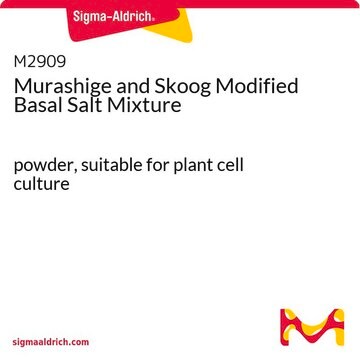D5417
Dicamba
suitable for plant cell culture, BioReagent
Synonym(s):
3,6-Dichloro-2-methoxybenzoic acid, 3,6-Dichloro-o-anisic acid
About This Item
Recommended Products
product line
BioReagent
Quality Level
form
powder
technique(s)
cell culture | plant: suitable
mp
112-116 °C (lit.)
application(s)
agriculture
storage temp.
2-8°C
SMILES string
COc1c(Cl)ccc(Cl)c1C(O)=O
InChI
1S/C8H6Cl2O3/c1-13-7-5(10)3-2-4(9)6(7)8(11)12/h2-3H,1H3,(H,11,12)
InChI key
IWEDIXLBFLAXBO-UHFFFAOYSA-N
Looking for similar products? Visit Product Comparison Guide
General description
Application
- as an auxin to maintain wheat embryos post pollination
- as a Murashige and Skoog (MS) medium supplement to culture embryos
- as an auxin in induction medium to induce somatic embryogenesis in barely tissue culture
Biochem/physiol Actions
Packaging
Preparation Note
Signal Word
Danger
Hazard Statements
Precautionary Statements
Hazard Classifications
Acute Tox. 4 Oral - Aquatic Chronic 3 - Eye Dam. 1
Storage Class Code
11 - Combustible Solids
WGK
WGK 2
Flash Point(F)
Not applicable
Flash Point(C)
Not applicable
Personal Protective Equipment
Certificates of Analysis (COA)
Search for Certificates of Analysis (COA) by entering the products Lot/Batch Number. Lot and Batch Numbers can be found on a product’s label following the words ‘Lot’ or ‘Batch’.
Already Own This Product?
Find documentation for the products that you have recently purchased in the Document Library.
Customers Also Viewed
Our team of scientists has experience in all areas of research including Life Science, Material Science, Chemical Synthesis, Chromatography, Analytical and many others.
Contact Technical Service












